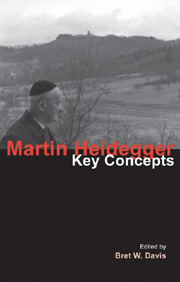Book contents
- Frontmatter
- Contents
- Contributors
- Acknowledgements
- Abbreviations
- Introduction: key concepts in Heidegger's thinking of being
- 1 Hermeneutics of facticity
- 2 Phenomenology: Heidegger after Husserl and the Greeks
- 3 Dasein as being-in-the-world
- 4 Care and authenticity
- 5 Being and time
- 6 The turn
- 7 Heidegger, National Socialism and the German People
- 8 Truth as alētheia and the clearing of beyng
- 9 The work of art
- 10 Ereignis: the event of appropriation
- 11 The history of being
- 12 Will and Gelassenheit
- 13 Ge-stell: enframing as the essence of technology
- 14 Language and poetry
- 15 The fourfold
- 16 Ontotheology and the question of god(s)
- 17 Heidegger on Christianity and divinity: a chronological compendium
- Chronology of Heidegger's life
- Bibliography
- Index
1 - Hermeneutics of facticity
- Frontmatter
- Contents
- Contributors
- Acknowledgements
- Abbreviations
- Introduction: key concepts in Heidegger's thinking of being
- 1 Hermeneutics of facticity
- 2 Phenomenology: Heidegger after Husserl and the Greeks
- 3 Dasein as being-in-the-world
- 4 Care and authenticity
- 5 Being and time
- 6 The turn
- 7 Heidegger, National Socialism and the German People
- 8 Truth as alētheia and the clearing of beyng
- 9 The work of art
- 10 Ereignis: the event of appropriation
- 11 The history of being
- 12 Will and Gelassenheit
- 13 Ge-stell: enframing as the essence of technology
- 14 Language and poetry
- 15 The fourfold
- 16 Ontotheology and the question of god(s)
- 17 Heidegger on Christianity and divinity: a chronological compendium
- Chronology of Heidegger's life
- Bibliography
- Index
Summary
Comprehending factical life in its holistic concreteness: through Dilthey to Heidegger
It was Fichte who first coined the abstract term “facticity” (Facticität; later Faktizität) for the philosophical tradition. He was thereby not referring to empirical facts or a collection of them, but to the central “fact” of the tradition of modern thought, which takes its starting-point from Descartes' famous regress to the “fact of the I-think”, understood as the irreducible limit of reflection behind which one can question no further. It then becomes the ground on which all of modern philosophy takes its stand in order, like Atlas, to move the entire world. The locution of the “fact of the I-think” appears on occasion in Kant's First Critique, which he supplements with another comprehensive fact early in the Second Critique, when he proclaims the moral law, in its correlation with freedom, to be “the sole fact of pure [practical] reason”. It might accordingly be called a transcendental fact, although Fichte tended to call it “facticity”, especially in his later lecture courses. The posthumous publication of these courses and later works by his theologian son, Immanuel Hermann Fichte, could be considered the most proximate source of the diffusion of the term into the nineteenth-century literature of both philosophy and theology. Nineteenth-century Protestant theology is replete with references to the “facticity” of the events of Christian salvation history, on which the Christian faith takes its original stand.
- Type
- Chapter
- Information
- Martin HeideggerKey Concepts, pp. 17 - 32Publisher: Acumen PublishingPrint publication year: 2009
- 1
- Cited by

